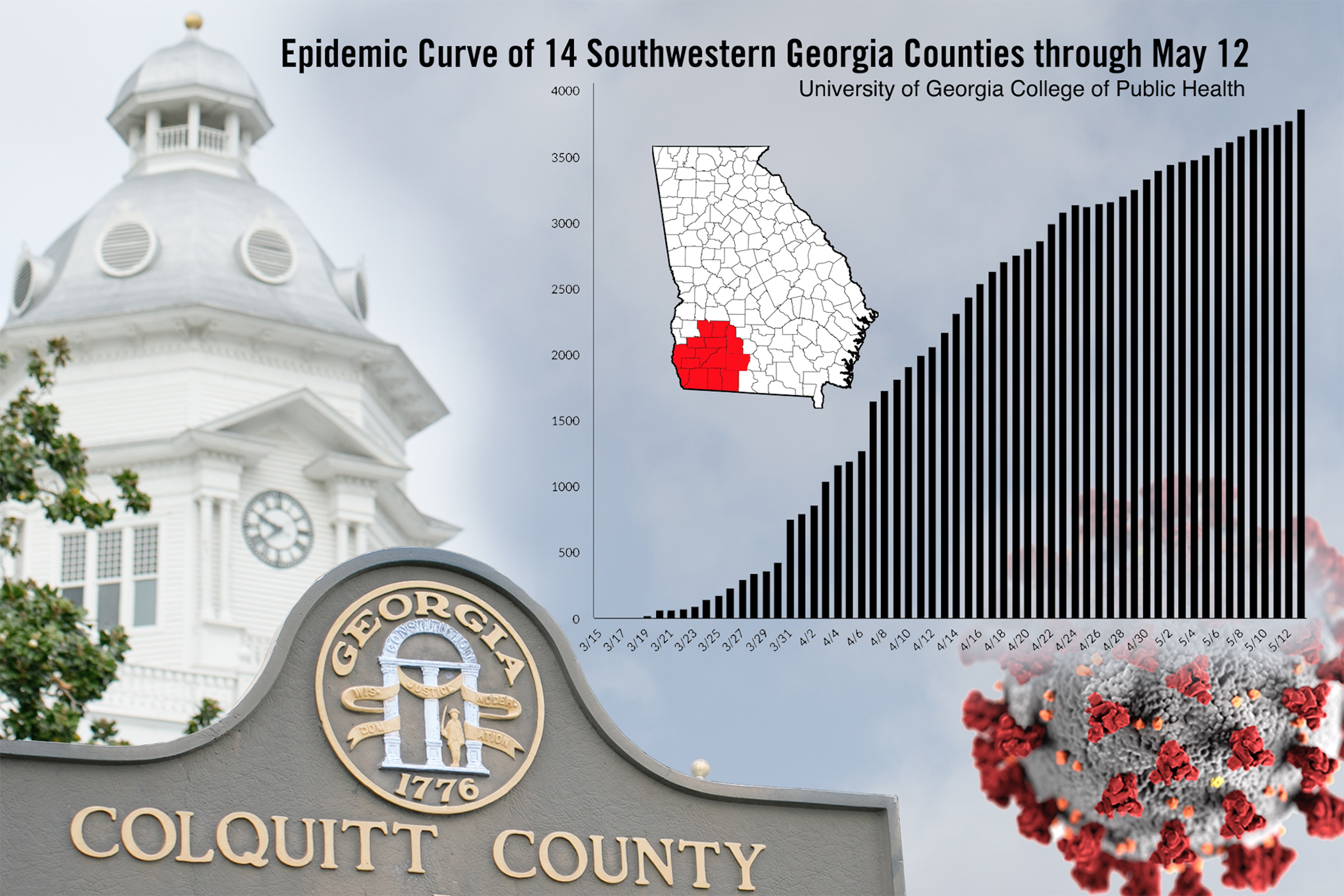Health care professionals in Colquitt County have been better able to plan for their providers’ and patients’ needs during the COVID-19 pandemic thanks to a customized report from the University of Georgia.
Produced by the College of Public Health in coordination with the Archway Partnership, a UGA Public Service and Outreach unit, the report outlined the number of weekly, confirmed COVID-19 cases and hospitalizations expected for Georgia’s 14-county Southwest Public Health District — a region that stretches from Lee County to Decatur County and includes more than 340,000 people.
The information included in the report provides regional hospitals with more accurate estimations than the national or state-wide reports and can help administrators prepare for their specific needs, said Grace Bagwell Adams, an associate professor in the College of Public Health.
“In terms of estimates, what we’ve learned about COVID-19 is that there’s a tremendous geographic variation at the sub-state level,” said Bagwell Adams, part of the five-member team that produced the report. “Having the ability to generate local data allows for far more precise efforts around preparation.”
The report showed the expected increase in the number of hospitalizations between May 15 and June 5 if residents practiced partial social distancing or no social distancing.
Bagwell Adams’ team estimated that on May 15, there would be 3,684 cases of COVID-19 when adherence to partial social distancing occurred. By June 5, that number would increase by 586 to 4,270.
The estimates were significantly higher for the scenario in which social distancing was not practiced at all. On May 15, the estimated number of cases of COVID-19 was 3,816. Estimates projected that by June 5, that number could swell by 2,491 to 6,307 if no social distancing occurred.
Colquitt Regional Medical Center CEO Jim Matney said the model confirmed that the actions the hospital took to mitigate the spread of the virus were correct.
“If we go through a resurge, we’ll have a certain level of confidence that we’re going down the right path of handling this virus,” Matney said.
According to Matney, Colquitt Regional made adjustments to its visitation policy and its elective surgery policy, separated COVID-19 patients from non-COVID-19 patients in the emergency room and the ICU, and ensured it had a stockpile of personal protective equipment.
“This model now allows me to say if I have 40 patients in the hospital with COVID-19, I can predict what my utilization of PPE is going to be,” Matney said. “It helps you plan for the worst-case scenario. It helps you plan for the peak. That’s the value of it.”
The county has used the data to encourage residents to practice social distancing and also has shared it with neighboring communities and organizations.
“Just seeing this and having something tangible, something visual, is another effective tool not just for hospital leadership, but for the average lay person here in southwest Georgia,” said Sarah Adams, the Archway Partnership professional in Colquitt County, who has undergraduate and graduate degrees in public health from UGA.
“I could potentially show these graphs to someone and say. ‘Here’s something that could happen; we want to avoid this and here’s some things you can do.’ So, it’s a quick, easy, effective tool that was put together by trusted experts, and we’re very fortunate to have this resource,” she said.
The College of Public Health had previously created a similar report for Athens-Clarke County, with Bagwell Adams and her team basing their work off a state-wide COVID-19 simulation model developed by UGA professors John Drake of the Odum School of Ecology and Andreas Handel of the College of Public Health.
When Colquitt Regional Medical Center reached out for help, Sarah Adams served as the intermediary between them and the College of Public Health, utilizing their 15-year relationship with the county to help facilitate communications and distribute the finished report.
“We’ve had this relationship since 2005,” said Rob Gordon, Archway Partnership director. “They were our first Archway community, and we’ve developed a relationship and trust that whatever the situation — whether it’s an emergency or not — we can find them a resource to address their questions and needs. That’s especially true in this situation where they’re really looking for quick answers, and the fact that they’ve had this longstanding relationship between the community, Archway and the College of Public Health really is the reason why they were able to provide help this quickly.”
Matney believes that longstanding relationship is an invaluable asset, helping the area’s health care industry—and the rural community as a whole—gain access to resources and expertise they normally wouldn’t have.
“The Archway folks and the University of Georgia folks and the College of Public Health, it doesn’t matter what we ask them or what we have a demand for, they’re always willing to look for some expert that can help us,” said Matney. “I don’t know how other small hospitals that don’t have a relationship with the University of Georgia make it.”


